Sexuality

HAS RELIGION ALIENATED you from your body, demonized your sexuality, or caused you to see your body as a source of shame? If so, it’s time to come home. In Sensual Faith: The Art of Coming Home to Your Body, body- and sex-positive pastor Lyvonne Briggs invites Black Christian women and femmes to reconnect with and feel at home in their bodies, sexuality, and sensuality: “You see, Sis, home is not an address; home is where you feel safe.” Finding home in our bodies is important because, all too often, Christian spaces have deemed our bodies “temptations” and our bodily processes “nasty.” And historically, American society has tried to control Black women’s bodies and sexualities, denying our humanity and womanhood through slavery, sterilization policies, and degrading stereotypes such as the asexual Mammy and the hypersexual Jezebel. So, the type of bodily reclamation Briggs writes of is an act of personal and societal justice.
Similar to theologian Candice Marie Benbow’s Red Lip Theology (2022), Sensual Faith is a womanist work that centers the experiences of Black women of faith. “Womanism” is the term coined by writer Alice Walker in the early 1980s to honor the experiences of Black women, who were often overlooked and excluded by the feminist movement. By utilizing a womanist interpretation of the Bible, Briggs challenges harmful religious messages around women’s bodies: “Womanism says: Your sexuality is a sacred gift. Your body is holy. Just as it is. Pleasure is your birthright.”

Wrestling with the complicated legacy of Christians and international adoption.
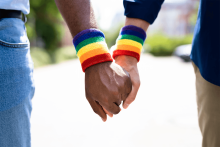
Over 65 percent of Black Protestants, Hispanic Catholics, white Catholics, white mainline Protestants, and white evangelical protestants say their friendship networks are exclusively heterosexual. Eighty percent of white evangelicals said they did not have any LGBTQ people in their friendship network, while 56 percent of religiously unaffiliated people said the same.

Love, Home, and Longing
Named after the hardy Korean herb, Minari follows a multigenerational Korean American family as they relocate to rural Arkansas to pursue the elusive “American Dream.” Lee Isaac Chung’s film is a stunning, visceral portrayal of creating roots of one’s own. A24 Films.
Called to Ministry
In Out in the Pulpit: The Lived Experiences of Lesbian Clergy in Four Protestant Mainline Denominations, Pamela Pater-Ennis uses theological and social work frameworks to highlight lesbian clergy, following 13 women as they reconcile their Christianity, gender, and sexuality. LifeRich Publishing.

Sojourners: Why write a book on sex and faith and shame?
Matthias Roberts: Many of us who grew up within purity culture have rejected the strict, moralistic guidelines around sex and sexuality we were raised with, but aren’t sure what beliefs we do still hold. As a counselor, I noticed coping mechanisms that aren’t necessarily the mosthealthy ways to work with our sexuality. I hope to name what those unhealthy coping mechanisms are and chart a way forward.
What is sexual shame? Shame is a core response that we have that makes us turn away. When things within our sexuality make us want to turn away from either ourselves or other people, we get sexual shame. Sexual shame affects us relationally—and not just within our sexual relationships. It can look like secrecy and avoidance: We’ve been taught we can’t express sexuality outside of particular contexts and yet most people are, so we hide that away, lie about it, or pretend it’s not there.
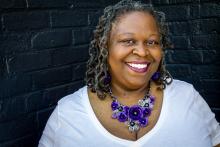
Amid ongoing conversations about the harm caused by a “purity” ethic taught within mostly evangelical churches in the 1990s-2000s (and for some, still today), a number of ethicists, theologians, pastors, and educators have been quietly shaping a new ethic — some for years.

Many grew up being told over and over that their virginity was the most important thing they could give their spouse on their wedding night, only to reach that point and realize that having saved themselves didn’t magically create sexual compatibility or solve their marital issues. Many soon divorced. Still others sat silently in their church groups, wondering what virginity could possibly mean for them as people who had been victims of incest or abuse or who felt attracted to the same gender.
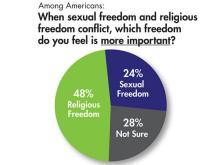
Researchers also asked about what people think motivates religious believers who oppose sexual freedom. Almost half — 49 percent — said faith is the motivator. A fifth — 20 percent — said the motivator is hate. Another 31 percent were not sure.

The United Methodist Church’s top court has ruled that the consecration of an openly gay pastor as bishop is against church law.
But, in a somewhat muddled ruling that could reflect the ongoing struggle to determine how great a role LGBTQ members can play in the second largest Protestant denomination in the U.S., the court also ruled that the Rev. Karen Oliveto, its first openly gay bishop, “remains in good standing.”
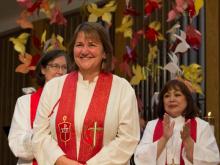
The head of the United Methodist Church’s Council of Bishops said the election of its first openly lesbian bishop last week “raises significant concerns and questions of church polity and unity.”
Bishop Bruce Ough, president of the Council of Bishops, said the executive committee of the bishops’ council “is monitoring this situation very closely.” The bishops are gathering July 19-20 in Chicago as part of the commission on sexuality called for by the General Conference.

At its quadrennial meeting last month, the United Methodist Church decided not to take up contentious LGBT issues. But that’s not stopping its regional conferences from making decisions on their own.
Two U.S. jurisdictions will consider three openly gay candidates for bishop next month.

Growing up in the seventies, I never questioned my parents’ love for their adopted homeland.
And yet as immigrants from Argentina, there were things they did not love: rock and roll music, and teenagers having sex.

The Scottish Episcopal Church may become the first major church in the United Kingdom to allow its clergy to conduct same-sex weddings in churches.
The General Synod of the Scottish Episcopal Church, meeting in the Scottish capital, Edinburgh, passed on first reading a change to its canon law definition of marriage June 10.
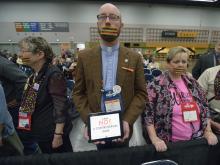
The United Methodist Church is struggling to maintain unity amid deep divisions over Scripture and sexuality, the presiding bishop of America’s second-largest Protestant denomination acknowledged.
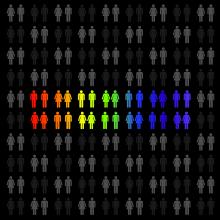
Russell Moore wrote an article May 13 about the Obama administration’s move to protect trans students in public schools across the country. While I disagree with Moore on many topics, I respect him as a compassionate leader and I’ve appreciated the ways he’s challenged the Southern Baptist Convention to seek justice for many who have been marginalized. This article was uncharacteristically culture war-y and fear-based, though. It contributes to the narratives that lead to the kind of bullying and discrimination that the Obama administration is seeking to end.Russell Moore wrote an article May 13 about the Obama administration’s move to protect trans students in public schools across the country. While I disagree with Moore on many topics, I respect him as a compassionate leader and I’ve appreciated the ways he’s challenged the Southern Baptist Convention to seek justice for many who have been marginalized. This article was uncharacteristically culture war-y and fear-based, though. It contributes to the narratives that lead to the kind of bullying and discrimination that the Obama administration is seeking to end.

Last fall, in the middle of my first attempt at the academic job market, I got invited to a wedding in far west Texas. By “far west Texas” I mean Marathon, in the part of the state known as Big Bend, about a seven-hour drive from my house. It’s a beautiful drive, moving from the Hill Country of central Texas into grasslands that, somewhere between Sonora and Ozona, give way into the desert that leads up into the low mountains of Big Bend. Or at least I find the drive beautiful — another wedding guest complained at the rehearsal dinner that there was nothing to look at on the drive.
I had some time to go for a run on Saturday morning, so I laced up my shoes and headed down Avenue D, across 1st street and a pair of train tracks. A quarter-mile later (no suburbs or outskirts in Marathon), I was in the desert.
Joan Didion says we’re “well advised to keep on nodding terms with the people we used to be” because “otherwise they turn up unannounced and surprise us, come hammering on the mind’s door at 4 a.m. of a bad night and demand to know who deserted them, who betrayed them, who is going to make amends.”
Well, 17-year-old me isn’t as mad as Didion’s younger self sounds, but he was out there in the desert nonetheless, asking, "Why haven’t you been back here?"
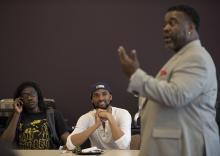
Is gay marriage a civil right like black equality? Or is it a sin African-Americans should condemn?
That’s the question at the heart of The New Black, a documentary by filmmaker Yoruba Richen that examines African-American attitudes toward LGBT people leading up to Maryland’s public referendum on gay marriage in 2012.
The film is now enjoying a new life as part of an initiative to get students at historically black colleges and universities to talk about a longtime taboo in the African-American community — sexual identity and the church.

Should Christians like horror movies?
It’s a question that many a Christ-following cinema junkie has had to ask themselves. It’s hard not to feel a bit conflicted enjoying a zombie apocalypse or a masked maniac when peace and tolerance are core parts of your belief system. If we’re going to be discerning consumers of culture, what value is there in horror?
I could pose one of a dozen different possible answers, each with their own set of arguments — for example, how the collective act of yelling in the dark at a dumb teen NOT TO GO IN THE CABIN transcends race, politics, and gender. Or how horror can help us embrace the inherently supernatural elements of faith. Or how it does the important job of reminding us that evil exists in the world, and can take on any number of forms.
But the argument that truly separates the wheat from the tares is that great horror, going all the way back to its roots in gothic literature, offers some of the best social commentary there is. Truly iconic horror films (and horror stories, for that matter) allow us to go below the surface of your basic spine-chiller, and think about everything from racism to gender politics to the afterlife.
Horror is at its best when it gives you something to think about along with your creeps. The new film It Follows, out this weekend, fits that bill quite well. It also happens to be one of the scariest movies this year.
The plot feels like classic urban legend. Teenager Jay (Maika Monroe) is dating the slightly older Hugh (Jake Weary), and decides one night to go all the way with him. Once it’s over, however, Hugh informs Jay that he’s cursed by a demon, a demon he’s now passed on to her. The demon will follow Jay, slowly and consistently, until it catches up with her and kills her, unless she first passes it on to someone else through sexual contact. If the demon kills her, it will then return to stalk and kill Hugh. Only Jay can see the demon, and it can look like anyone, be it a stranger, friend, or beloved family member.
This premise could easily be turned into something silly and gratuitous, and were it a studio venture instead of a smaller independent film, It Follows might have been just that. But although writer-director David Robert Mitchell has made a movie in which sex plays a pivotal role, he’s more interested in the consequences of it than the act itself. It Follows is packed with symbolism that represents loss of innocence, the onset of adulthood, and reminders of mortality — the ever-approaching darkness that none of us escape. Grim, yes, but also pretty impressive in a genre more commonly associated with objectification and cheap thrills.

Some leaders use trending topics or hashtags to build momentum around a certain conversation. The idea is that by pointing followers to a catchy hashtag, activists can spark conversation and rally supporters around a cause. On Nov. 24, for example, Twitter lit up with the hashtag #PrayForFerguson after a grand jury decided not to indict a white police officer who fatally shot a black teenager.
One of the earlier noteworthy mobilizing campaigns included #KONY2012, a movement founded by a Christian, who launched a campaign to try to capture African Lord’s Resistance Army leader Joseph Kony. First Lady Michelle Obama famously participated in the #BringBackOurGirls campaign after more than 200 Nigerian schoolgirls were kidnapped by the terrorist group Boko Haram.
But everyone on Twitter is learning that a hashtag cuts both ways — it can be hijacked or lampooned by detractors, and it’s a key way that online activists are pushing back against opposing messages or what some might even call hate speech.

When Southern Baptists convened a national conference in Nashville, Tenn., this week to discuss issues of human sexuality, bringing conservative evangelicals and LGBT Christian activists into the same ballroom was a recipe ripe for potential fireworks.
Perhaps the most shocking thing was how few fireworks there were.
The Southern Baptist Convention’s Ethics and Religious Liberty Commission was clear: Sex is reserved between a man and a woman within the bonds in marriage. And openly gay evangelicals in attendance were equally clear: Homosexuality is not incompatible with Christianity.
No concessions were made, but leaders on both sides expressed surprise at how the two agreed to coexist. Put another way: The old emphasis on “Love the sinner, hate the sin” has become more a version of simply “Love all sinners. Ask questions later.”
“I do want to apologize to the gay and lesbian community on behalf of my community and me for not standing up against abuse and discrimination directed towards you. That was wrong and we need your forgiveness,” said North Carolina megachurch pastor J.D. Greear, drawing applause.
“We have to love our gay neighbor more than our position on sexual morality.”